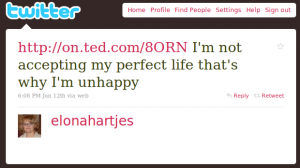This post was inspired by this passage from Teachers Should be Seen and not Heard by Anthony Mullen in EdWeek, Jan. 7, 2010.
“What do you think?” the senator asked….
…”I’m thinking about the current health care debate, “I said. “And I am wondering if I will be asked to sit on a national committee charged with the task of creating a core curriculum of medical procedures to be used in hospital emergency rooms.”
The strange little man cocks his head and, suddenly, the fly on the wall has everyone’s attention.
“I realize that most people would think I am unqualified to sit on such a committee because I am not a doctor, I have never worked in an emergency room, and I have never treated a single patient. So what? Today I have listened to people who are not teachers, have never worked in a classroom, and have never taught a single student tell me how to teach.”
In Quebec it is the provincial government’s Ministry of Education, Leisure, and Sports (MELS) who tells us how to teach, via the consultants who work for the Quebec English Schools Network (LEARN) via the consultants who work for our school boards, via our principals, via our department heads. At least that is how it is supposed to go, in the government’s perfect world, I guess.
I, more often than not, go straight to the source. I read my curriculum, The Quebec Education Program (QEP aka ‘The Brick’), which offers philosophy, nothing tangible, then I create the tangible – the daily activities, from data-collection to project to evaluation and back again. Sometimes I do so on my own, sometimes with other teachers. I definitely spend a lot of time doing my own research into how/what/why to teach the students in my care. Some of what I use has been provided by other teachers who do the same. Some of it I found on my own, rarely via consultants though it does happen at times. Whatever it is I do my first and foremost truth is to my students, then I am true to the curriculum.
There are consultants available to me. Why don’t I use them? I consulted for a year. I had to get back into the classroom, as I often say, because I missed the daily energy of contact with students. But there was more to my decision to leave consulting than that. I felt that I was losing my credibility as a teacher. Who was I to consult with teachers on how to deal with the kids in their classrooms when I was no longer in the classroom? The nature of the students I teach changes every year. The further I was away from the classroom the less right I felt about consulting on the subject.
Does this mean there is no room for the consultant? No. But we need to look at how consulting happens. Too often consultants have never been teachers. They have never had to negotiate the many layers of teaching in a classroom – from pedagogy, to behaviour, to technology, to management, to learning disabilities, to multiple subject matters, to headaches, sore stomachs, teen girls at their time of the month, the farts, the dress code, the Internet not working, the why do I have to sit there?s, the exam stress, the I don’t know how to read but I think no one knows so I will continue to be a pain in the ass so no one ever finds outs. I’ll stop there.
What if teachers consulted with each other? If part of our workload was about learning and sharing about something specific, either in content or in process – say history or using laptops in the classroom? Something that relates to what we mainly teach. How much more satisfying and meaningful would my job be if I could teach a bit less and have time to research and share with my colleagues?
How do you think that would work? I’d be interested in seeing what different people think about this, from consultants to administrators to teachers. If you are a consultant does it make you angry to read what I wrote? If you are a teacher would you want to be scheduled to research and share? If you are an administrator do you trust your teachers to research and share? Is anyone already doing all of that?

